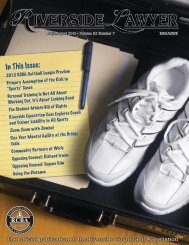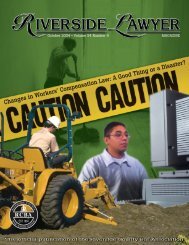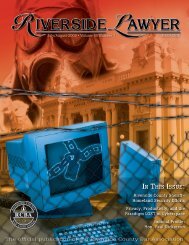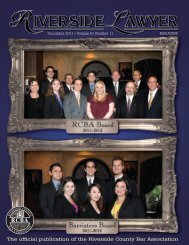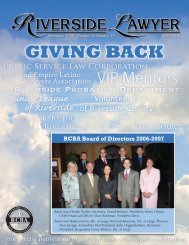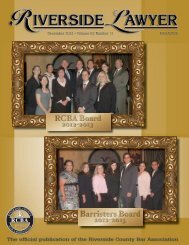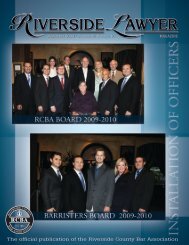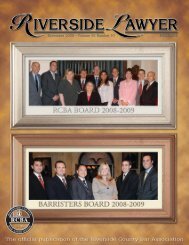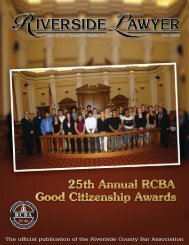In This Issue: - Riverside County Bar Association
In This Issue: - Riverside County Bar Association
In This Issue: - Riverside County Bar Association
You also want an ePaper? Increase the reach of your titles
YUMPU automatically turns print PDFs into web optimized ePapers that Google loves.
Elder Bankruptcy Filings: Capacity <strong>Issue</strong>s<br />
Older Americans are filing for bankruptcy at increasing<br />
rates. 1 And as the age of the average bankruptcy debtor<br />
increases, it appears that there is an increase in the number<br />
of debtors filing bankruptcy who have chronic and disabling<br />
medical conditions. Some of these individuals may lack<br />
the physical capacity to undertake those actions necessary<br />
to complete a bankruptcy filing successfully and obtain a<br />
bankruptcy discharge of their debts. Others may lack the<br />
mental capacity or competency to make financial decisions.<br />
<strong>In</strong>evitably, there has been a rise in situations involving family<br />
members seeking to file bankruptcy cases for incapacitated<br />
relatives.<br />
Unfortunately, some aspects of the law in this area are<br />
unsettled and not well-developed. All too frequently, wellmeaning<br />
relatives attempt to file bankruptcy cases for incapacitated,<br />
financially distressed family members in a haphazard,<br />
improper fashion. Often, they run to the bankruptcy<br />
court armed only with a doctor’s note attesting to the poor<br />
physical health or mental condition of their family member.<br />
Other individuals run to a local stationery store or look on<br />
the internet for a fill-in-the-blanks power of attorney form<br />
to support a bankruptcy filing. At times, family members<br />
risk committing bankruptcy crimes by forging documents<br />
and making false statements as they attempt to commence<br />
a bankruptcy case for a disabled or incompetent relative.<br />
Even experienced bankruptcy lawyers lack familiarity with<br />
the rules.<br />
<strong>In</strong>capacitated Debtors<br />
The first question is whether incapacitated individuals<br />
can file bankruptcy. The short answer is, “Yes.” The<br />
Bankruptcy Code contemplates that incapacitated individuals<br />
may be bankruptcy debtors, and courts agree. 2<br />
Under Section 301 of the Bankruptcy Code, 3 a voluntary<br />
bankruptcy case may be commenced only when an<br />
individual who may be a debtor files a bankruptcy petition.<br />
<strong>In</strong> turn, Section 109 states who may be a debtor. And that<br />
section contains no restrictions on incapacitated or disabled<br />
debtors. 4<br />
1 See generally, J. Golmant and J. Woods, “Aging and Bankruptcy<br />
Revisited,” American Bankruptcy <strong>In</strong>stitute Journal (Sept. 2010); J.<br />
Pottow, The Rise in Elder Bankruptcy Filings and Failure of U.S.<br />
Bankruptcy Law, 19 Elder L.J. 119 (2011).<br />
2 <strong>In</strong> re Myers, 350 B.R. 760, 762-3 (Bankr. N.D. Ohio 2006)<br />
(collecting cases).<br />
3 Unless otherwise noted, all statutory references are to the<br />
Bankruptcy Code, Title 11, United States Code, and rule references<br />
are to the Federal Rules of Bankruptcy Procedure.<br />
4 <strong>In</strong> fact, Section 109 supports the filing of bankruptcy by<br />
20 <strong>Riverside</strong> Lawyer, June 2012<br />
by Peter C. Anderson and Abram S. Feuerstein<br />
Filing Through a Representative or Next<br />
Friend<br />
Given that disabled and incapacitated debtors may file<br />
bankruptcy, the next question that arises is who, if anyone,<br />
has the authority to file a bankruptcy petition on behalf of<br />
a debtor who lacks capacity. <strong>In</strong> answering this question,<br />
the Bankruptcy Code and the Federal Rules of Bankruptcy<br />
Procedure provide only limited guidance.<br />
Under Rule 1004.1, “[i]f an infant or incompetent person<br />
has a representative, including a general guardian, committee,<br />
conservator, or similar fiduciary, the representative<br />
may file a bankruptcy petition on behalf of the infant or<br />
incompetent person.”<br />
Rule 1004.1 also provides that if an infant or incompetent<br />
person does not have a duly appointed representative,<br />
the person “may file a voluntary petition by next friend or<br />
guardian ad litem. The court shall appoint a guardian ad<br />
litem for an infant or incompetent person who is a debtor<br />
and is not otherwise represented or shall make any other<br />
order to protect the infant or incompetent debtor.”<br />
Hence, to the extent that a bankruptcy petition is filed<br />
by a representative on behalf of an infant or an incompetent<br />
person, sound practice dictates that counsel should ensure<br />
that appropriate documentation is filed with the petition<br />
establishing the representative’s authority to file the petition.<br />
However, if no representative exists, the parties should<br />
follow Rule 1004.1 and seek an immediate court order<br />
appointing a guardian or a next friend. 5<br />
incapacitated and/or disabled persons. Most non-bankruptcy<br />
lawyers are generally aware that in 2005, Congress enacted<br />
substantial measures to reform the nation’s bankruptcy laws.<br />
As part of these wide-ranging amendments, Congress enacted<br />
educational requirements for bankruptcy debtors. These mandate<br />
that debtors take a pre-bankruptcy credit counseling class, and,<br />
as a condition of receiving a bankruptcy discharge, debtors are<br />
required to take a financial management course after they file<br />
bankruptcy.<br />
Under Section 109(h)(4), incapacitated or disabled debtors<br />
are specifically exempted from meeting the pre-bankruptcy<br />
educational requirement. Similarly, the discharge provisions<br />
of the Bankruptcy Code exempt incapacitated debtors from the<br />
requirement of completing a post-filing course. These provisions<br />
manifest a Congressional awareness that incapacitated persons<br />
could indeed be bankruptcy debtors, and Congress went the extra<br />
step of excluding such debtors from the newly enacted educational<br />
requirements.<br />
5 The representative and/or would-be representative faces another<br />
hurdle involving the educational requirements added to the<br />
Bankruptcy Code in 2005. The code’s educational requirements<br />
may be a nondelegable duty. See, e.g., <strong>In</strong> re Hammer, 2008



